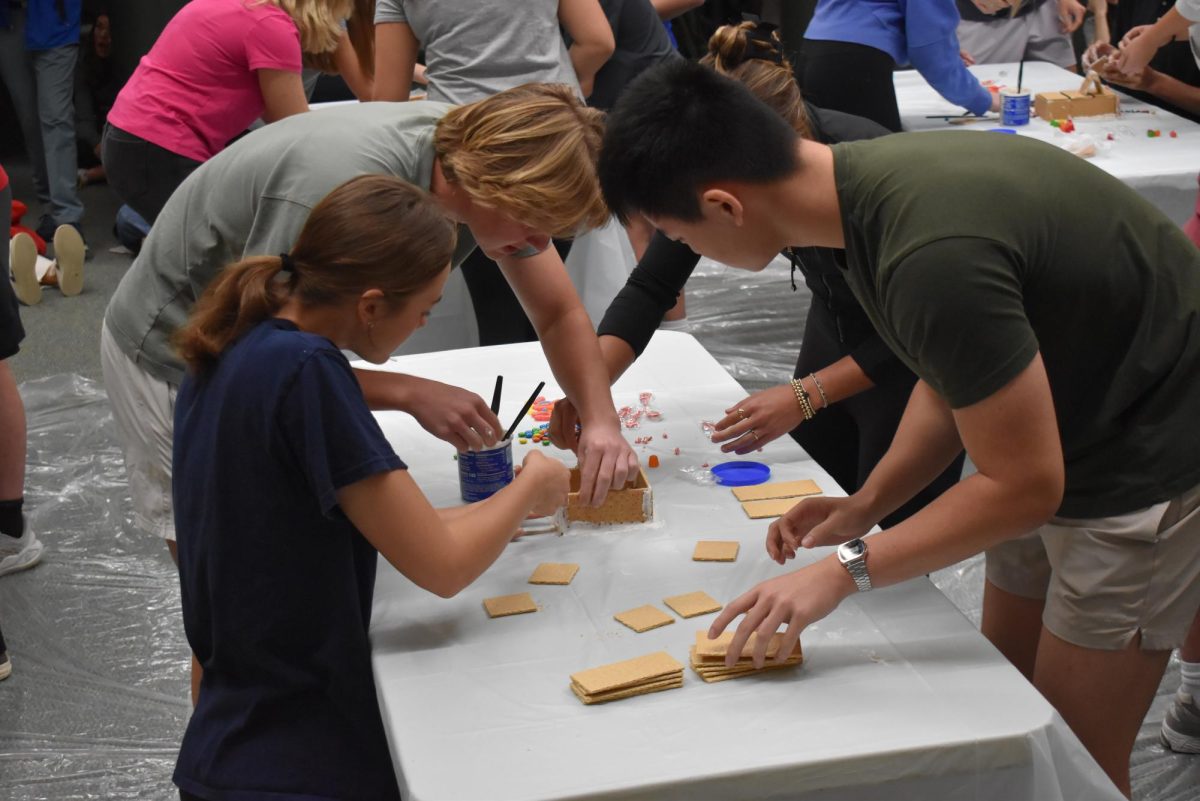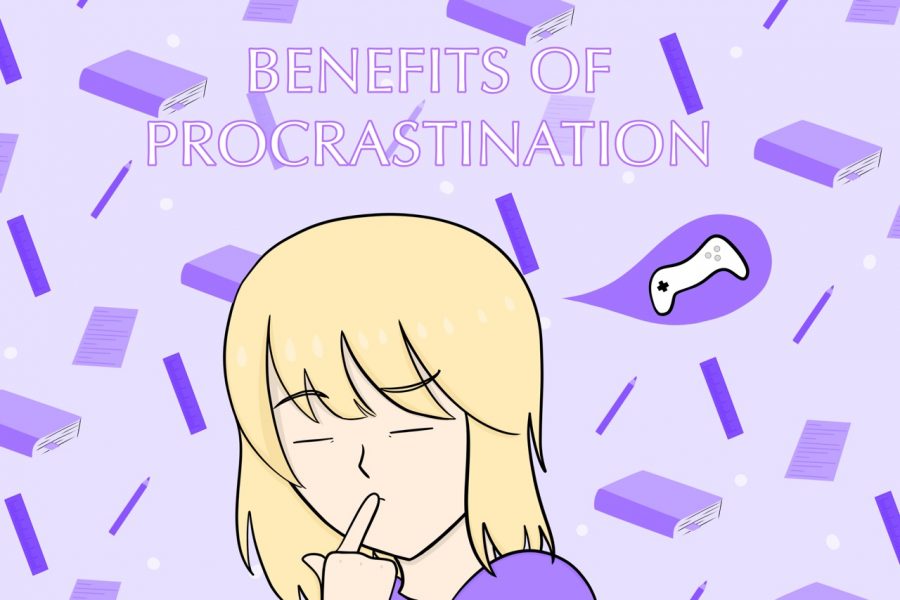The benefits of procrastination in moderation
Procrastination has never been viewed as a “good thing,” especially here at Saint Stephen’s. But is it all bad? Or is there more to the story?
This art work, by staff writer Evanthia Stirou, explains the concept of procrastination: knowing there’s work to do but thinking, or doing, something else.
November 5, 2020
As Saint Stephen’s students, a concept that is always being thrown at us by teachers and parents is the importance of time management. Just hearing those words makes me want to crawl up into a ball do the exact opposite: procrastinate. And though procrastination gets a bad rap, it isn’t as bad as people (in particular, teachers) usually think.
Here’s why.
I can see why spacing out and scheduling your assignments may seem like a useful and productive idea, but I would argue that waiting until the last minute can be just as effective.
Now listen, I’m not telling you to leave all of your most important AP class assignments until the day of. That’s not what I’m suggesting (although I have definitely had my fair share of those late-night grind sessions), but leaving just one or two things to the night before they’re due is okay, and might possibly work in your favor.
Procrastination has always been thought of as irresponsible and risky, but those who think that may have never experienced the thrill of beginning to write a paper at 11:00 PM that’s due at 11:59 PM and submitting it with shaking, aching hands just seconds before the deadline.
In fact, teachers don’t seem to really notice if one of their students completed their assignment the night before. English teacher Mr. Johnson commented, “There are times when I don’t know if a student procrastinated, at least in the short run. But, because I teach English, it is clear when someone hasn’t taken the time to read, to write, or to revise.”
So, with the prerequisite that your teachers won’t always notice your night-before cram, if your work has been done correctly and with sufficient effort put into it that is, here are the actual benefits of procrastination. Really, the list of the perks of procrastination, surprisingly, goes on and on, but in my opinion, these are the most useful ones to note.
Originality and quality of ideas
“Personally, whenever I first get an idea that is good I typically stick with it and rarely change my mind later on,” said junior Jacob Gekht. In contrast to this “fixed” idea phenomenon, procrastination, when done correctly, gives you the freedom to explore all options before settling on the best one. By quickly looking over an essay prompt or project assignment, but not starting it, the question at hand won’t completely go away, but it will instead stay in the back of your mind.
In a New York Times article by Adam Grant, he discusses an experiment that was conducted to measure the creativity and originality of people’s ideas. The experiment randomly divided people into two separate groups. Group one was asked to come up with their business idea right away while group two was given five minutes to play Minesweeper or Solitaire.
In the end, “the procrastinators’ ideas [the ones who played a quick game of Minesweeper] were 28 percent more creative.”
What sparked this creativity, though, wasn’t the act of playing the game, rather, “When people played games before being told about the task, there was no increase in creativity. It was only when they first learned about the task and then put it off that they considered more novel ideas,” Grant wrote.
Fascinating. Letting your mind wander after a prompt is given, and not going with the first and usually most conventional idea, as Grant put it, you are allowing for new and original thoughts to form.
Let me prove this to you. It is currently 7:10 PM and I’ll be right back.
Okay, It’s a little bit later, 9:13 PM to be precise, and let me tell you, my mind is filled with ideas for the rest of this article. Keep reading and you’ll see what those two hours and three minutes generated in my brain.
Actively thinking about the assignment
Saint Stephen’s Junior, Piper Chan said that by leaving a task off for weeks she’ll “end up forgetting about it when instead I could’ve been carefully preparing.”
Are you also scared you’ll forget about a given assignment like Piper is? Don’t be. The beauty of procrastination is that if you leave an assignment in limbo, you are more likely to remember it after you ultimately complete it. Grant said, “When we finish a project, we file it away. But when it’s in limbo, it stays active in our minds.” This allows our subconscious to formulate longer-lasting learning, along with better and more original ideas.
Adrenaline rush
The last major benefit I have personally experienced from procrastination is a little thing called adrenaline. We’ve all heard of this hormone but what is it? Adrenaline, in simple terms, is a hormone released into the body of someone feeling extreme emotions, which causes the person to have more energy. Nice, but how does it apply to procrastinating?
Well, when you finally sit down to write that one paper due at midnight with the numerous ideas that have been created in the back of your head, you get a rush. It’s like all of your thinking is finally being shared on paper, but your brain is also aware that you’re on a time limit. Therefore, the release of adrenaline is bound to happen as your fingers race across your keyboard and the clock gets closer and closer to that 11:59 PM mark. Just thinking about it gives me a thrill.
Junior Nikole Gaydos shared a familiar sense of fear about waiting until the last minute: “…If I wait until the night before to complete an assignment, I risk not getting it in on time.”
With the impacts of increased adrenaline flow, it could be argued that Nikole’s concerns can be replaced by awareness that she can complete the task. When your bloodstream is filled with adrenaline the brain is highly oxygenated, fully engaged and aware, and hyper-focused on the task at hand. Meaning, you won’t get sidetracked and you’re probably more focused than you would have been writing it weeks ago.
Now, I beg all of you to please not start leaving everything to the last second. Struggling in your classes and lagging behind is not the goal of my thoughts in this article. The big picture is that procrastination, something we normally feel guilty about, isn’t all bad. There are different strategies for learning and find what style works best for you is important.
You also need to know what type of student you are and what assignments you need to do ahead of time. Procrastination isn’t for everyone, so only try it if you feel as if you can handle it.
The trick is to rewire your mind. Instead of thinking about all those times your advisor told you to manage your time better and to not delay assignments, try and re-think that and take that advice with a grain of salt. You know yourself better than anyone else, and who knows, maybe a little procrastination in your life will do more good than bad.




























































